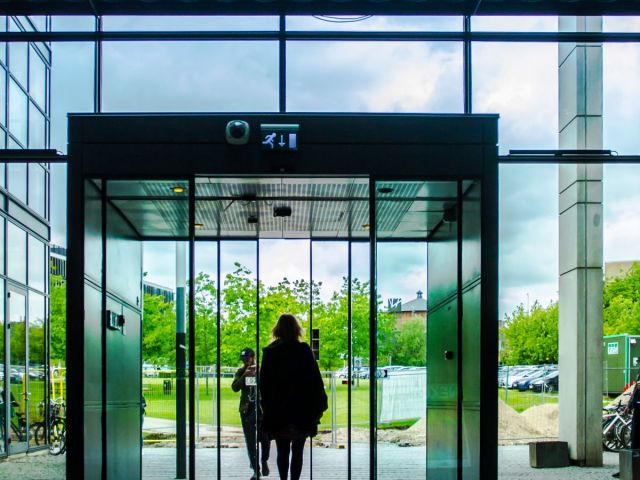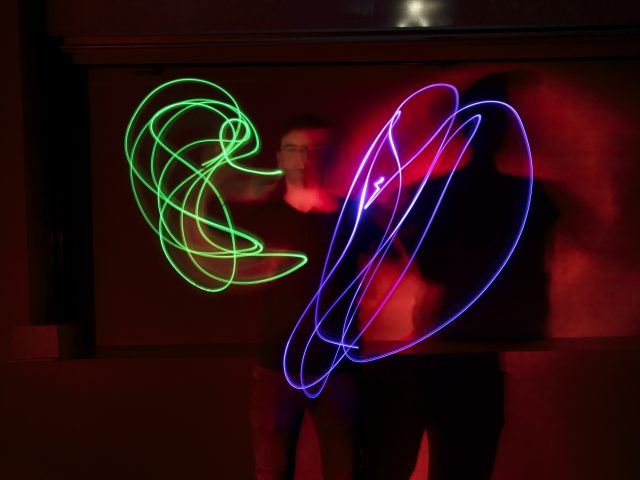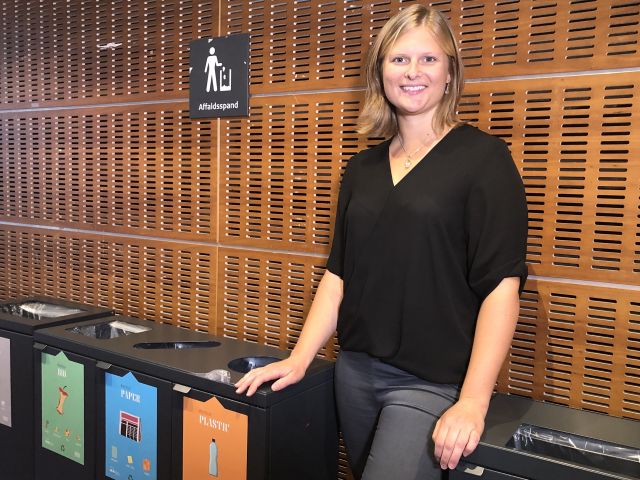Students flunked online teaching – now 50 percent of it is online: “Preparation is the key”

The Dean of Education looks back on a spring semester which he describes as “a mass online conversion experiment”. It was also a semester where, in surveys, students flunked the quality of the teaching. This semester, 50 percent of the teaching is online, and what makes a big difference is that “everyone is better prepared,” says Gregor Halff.
Campus is starting to look like its old self once again. Students are hanging out in the common areas and walk to and from classrooms and auditoriums with guidance from stickers on the floor reminding everyone to keep to the right in narrow places.
This semester is significantly affected by the spring lockdown, both in terms of how we can socialize with each other on campus, but also how teaching is conducted. 50 percent of the teaching will be online to ensure that the campus is not overcrowded and the perfect place for the virus to spread – a decision that was made back in May.
CBS WIRE met with CBS Dean of Education, Gregor Halff on Teams to discuss the main takeaways from the spring semester, students’ experiences of and expectations about online teaching, and what the lockdown has taught CBS.
But for starters, Gregor Halff reflects on what he experienced as Dean of Education during the lockdown.
“I was in a very fortunate situation, as I had an overview of how different parts of CBS reacted. There first were 24 hours where everybody seemed to hold their breath. There then followed an amazing amount of resilience, community building and an energy to move forward. And, of course, also struggles, and resolutions to those struggles, all with the aim of making teaching and learning move on,” he says.
Some teaching or no teaching at all
During the spring and early summer, CBS students shared their opinions in articles on CBS WIRE and in surveys conducted by CBS Students and DJØF about the online teaching they had received.
Some liked that they could easily press pause, rewind or fast forward in prerecorded sessions, while others felt that the course outcome was insufficient compared to what they could have gained in a physical classroom. But overall, the students were not satisfied with the teaching quality, according to the surveys.
“When we look at the teaching in spring, we should be careful what we are comparing it with. Teachers and students could not come to campus. So it was either no teaching or online teaching. Between those two alternatives, I’m very proud of what we achieved. We even managed to make practically all final year students graduate as planned,” he says and continues:
“If we look at the survey results, they illustrate that we went through a mass online conversion experiment. And I’m happy to see that the students care about the learning experience, which is why we made a similar research project to investigate this further, in order to create a larger dataset that we can learn from.”

The results from the research project are starting to show, and according to Gregor Halff, are revealing two tendencies in particular.
“We’ve learned that in order to make blended learning work, we need to look at every course and figure out what we want to achieve and how it can be achieved, either online or on campus,” he says.
“We’ve also learned from the data that many communities were formed, as were more self-forming student groups, which is excellent, and more teaching groups, which is equally encouraging. And I think we need to look much more into how communities can be used to strengthen learning goals.”
However, when asked to name the biggest takeaway from the spring semester, Gregor Halff mentions but one word.
“Preparation. Prepare, prepare, prepare. That’s what matters for teachers and students. In the spring, the learning wasn’t well-planned and blended, it was an overnight mass online conversion. Therefore, when we started to talk about the fall semester, we knew we had to begin planning already back in May to give the students and teachers time to prepare,” he says.
Therefore, he expects that the experience of the teaching this semester will be different from spring.
“The teaching will be better prepared. The teachers have actually had a chance to think things through and consider what works for their courses,” he says.
The world is not the same
According to a news article at CBS.dk posted on July 28, the expectation is “that the teaching activities will be of the same high quality as before COVID-19”.
When asked if he agrees, Gregor Halff argues that it will be hard to compare anything to pre-COVID-19.
“The world will not return to pre-COVID-19 times. Industries are different, traveling will be different, offices will be different and the same goes for teaching and learning. So I’m not sure if it’s fair to compare our teaching to pre-COVID-19. But this has given us an opportunity to assess all our courses and goals for learning and teaching. And we will probably spend a lot more time on this aspect this term,” he says.
Students and teachers probably have a wide range of expectations for this semester. And so has Gregor Halff.
“I expect that we will make new discoveries. That we will have deeper conversations about what we are trying to achieve and what high-quality education is. That’s a real opportunity we have been given, and it depends on the teachers and on the students as well, since the answers to these questions will differ and we can consider and learn from that,” he says.







































































































































Comments